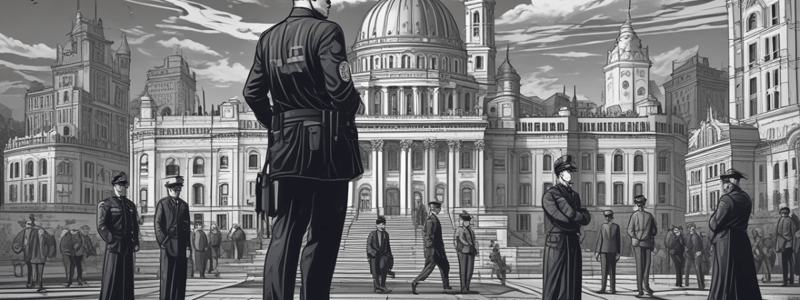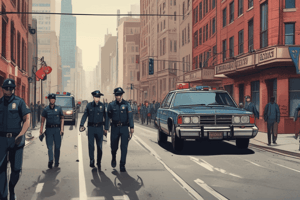Podcast
Questions and Answers
What must exist for the state to be held liable under the Special Relationship Doctrine?
What must exist for the state to be held liable under the Special Relationship Doctrine?
- Overwhelming public demand for police protection
- A special relationship between the police and the victim (correct)
- A general duty of care towards all citizens
- Skills of the police officers involved
Which of the following is true regarding abandonment cases involving police?
Which of the following is true regarding abandonment cases involving police?
- Abandonment cases only arise during pursuits
- Qualified immunity typically protects police in such cases (correct)
- Victims can always recover damages from police
- Police are always liable in abandonment cases
What can lead to liability for police and the city when they assure protection to a victim?
What can lead to liability for police and the city when they assure protection to a victim?
- A promise of protection is later unfulfilled (correct)
- Use of excessive force during an arrest
- Following standard operational procedures
- Involvement in a high-speed chase
What is a barrier to negligence claims against the police for failure to arrest a drunk driver?
What is a barrier to negligence claims against the police for failure to arrest a drunk driver?
In the context of negligence, what does contributory negligence imply?
In the context of negligence, what does contributory negligence imply?
How is the 'Four Zones of Negligence' structured?
How is the 'Four Zones of Negligence' structured?
Which of the following best describes a 'special relationship' in legal terms?
Which of the following best describes a 'special relationship' in legal terms?
What was the outcome in the case of White v Rockford?
What was the outcome in the case of White v Rockford?
What is one of the main reasons for the increase in police civil liability litigation since 1960?
What is one of the main reasons for the increase in police civil liability litigation since 1960?
Which element is NOT required to establish a case of negligence in police civil liability?
Which element is NOT required to establish a case of negligence in police civil liability?
Which of the following is considered a common form of intentional tort against police?
Which of the following is considered a common form of intentional tort against police?
What must be established for a claim of false arrest?
What must be established for a claim of false arrest?
What percentage of police encounters with suspects is estimated to potentially result in civil litigation?
What percentage of police encounters with suspects is estimated to potentially result in civil litigation?
Which of the following is true regarding frivolous lawsuits?
Which of the following is true regarding frivolous lawsuits?
Which of these factors might lead law enforcement officers to become overly timid or indecisive?
Which of these factors might lead law enforcement officers to become overly timid or indecisive?
What is the average time frame for a civil liability case against police to reach final disposition?
What is the average time frame for a civil liability case against police to reach final disposition?
Which legal aspect of police duty involves ensuring the safety of individuals involved in an incident?
Which legal aspect of police duty involves ensuring the safety of individuals involved in an incident?
In negligence lawsuits against police, what must a plaintiff prove in addition to establishing a special duty relationship?
In negligence lawsuits against police, what must a plaintiff prove in addition to establishing a special duty relationship?
What is one reason why general duty of care seldom results in liability for self-inflicted injuries?
What is one reason why general duty of care seldom results in liability for self-inflicted injuries?
Which situation demands a higher standard of police supervision for detainees?
Which situation demands a higher standard of police supervision for detainees?
What does the foreseeability of suicide entail in the context of police duty?
What does the foreseeability of suicide entail in the context of police duty?
Which principle states that as legal precedents become clearer, fewer officers will attain qualified immunity for their actions?
Which principle states that as legal precedents become clearer, fewer officers will attain qualified immunity for their actions?
What is the primary focus of civil litigation in police encounters?
What is the primary focus of civil litigation in police encounters?
Which of the following is a condition influencing reasonable care for detainees?
Which of the following is a condition influencing reasonable care for detainees?
Flashcards are hidden until you start studying
Study Notes
Governmental Liability and Police Duties
- The Public Duty Doctrine indicates police do not have a duty to protect the public unless a "special relationship" exists.
- The Special Relationship Doctrine allows state liability for a third party's victimization if the state has custody of the individual, particularly if custody is against their will.
- Police typically have qualified immunity in abandonment cases, allowing them to prevail legally when abandoning vehicle occupants.
- In White v. Rockford, police were held liable for arresting a caretaker and leaving children unattended on the roadside.
- Police can be held liable for failing to protect victims of third-party violence after providing assurances of protection, especially when plaintiffs rely on these assurances.
Trends and Effects of Civil Liability
- Civil suits against police have increased significantly since the 1960s, along with the number of successful litigations.
- Many judgments against police have occurred despite their good records, raising concerns about police morale and public relations.
- Concerns include erosion of public trust, alienation from the community, and barriers to understanding complex policing issues.
Legal Aspects of Negligence
- The timeframe for a civil liability case against police can extend from three to ten years from the incident to the final decision.
- A Direct Verdict is granted only when there is a total absence of evidence supporting the jury’s verdict.
- Only 0.1% of police encounters with suspects may lead to civil litigation.
- Four elements must be established to prove negligence: legal duty, breach of duty, proximate cause, and actual damage or injury.
Common Forms of Intentional Torts
- Common intentional torts against police include wrongful death, assault and battery, false arrest, invasion of privacy, and intentional infliction of emotional distress.
- Claims of false arrest require that police detained individuals willfully, without authority, against their will, and were aware of the confinement.
- Invasion of privacy demands proof of intrusion, offensiveness, and a legitimate expectation of privacy.
Liability and Officer Conduct
- An estimated 15-25% of police officers may be sued, but frivolous lawsuits are those lacking a legal basis.
- Officers fearing personal liability may become overly cautious, impacting their decision-making in arrests and searches.
- Only 4-8% of lawsuits against police are lost, with around 25% settled outside court.
- A ruling by Justice Marksman acknowledges that fleeing parties during police pursuits could lead to government liability.
Police Duties and Special Care
- Legal obligations of police include duties to warn and protect, render assistance, investigate traffic accidents, and secure accident scenes.
- Courts recognize that law enforcement has a duty of care to individuals in their custody, extending beyond those incarcerated to include individuals physically in their custody.
- General duty of care seldom results in liability for self-inflicted injuries or suicides, as these are usually considered intentional acts.
- Foreseeability of suicide is defined by the reasonable anticipation that harm may occur due to acts or omissions, influenced by various factors.
Breach of Duty and Supervision
- To establish negligence, plaintiffs must show a breach of the special duty owed by police, evaluated on a case-by-case basis.
- Expectations regarding police supervision vary; some rulings suggest reasonable care does not equate to constant supervision, while others mandate it for individuals at risk.
- Contributory negligence rulings have indicated that officers have a duty to prevent suicides, particularly for individuals with mental illnesses.
- As legal principles become better defined, qualified immunity for officers in misconduct cases is less likely to be granted.
Role of Courts in Civil Liability
- Courts are not the innovators in police or civil liability reform; rather, they react to existing changes in law and policy.
Studying That Suits You
Use AI to generate personalized quizzes and flashcards to suit your learning preferences.




